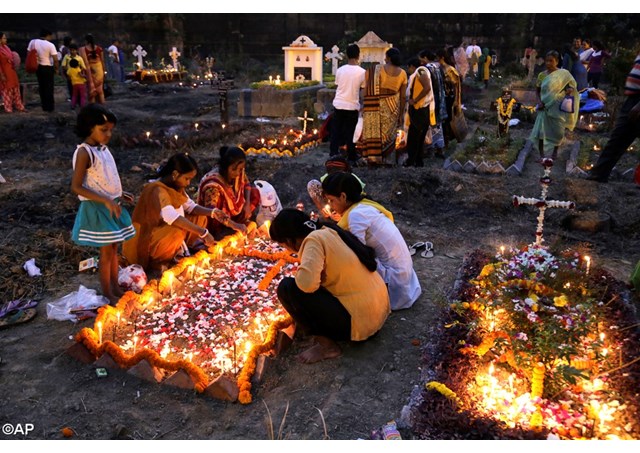
All Souls Day in South Asia an ecumenical event

The commemoration of All Souls Day, Nov. 2nd, in South Asia is great ecumenical event, as Protestants and Catholics in Bangladesh, India, Pakistan and Sri Lanka, flock to common cemeteries built during the British rule. "It is nice to see the cemetery has turned into a symbol of interchurch cooperation and harmony," Father Theotonius Rebeiro, chancellor of the Dhaka Archdiocese, told UCANEWS, talking about the 16th century Wari cemetery in Old Dhaka. Protestants and Catholics share the same space to bury their dead in Dhaka, the capital of Muslim-majority Bangladesh.
In other major cities and towns of the subcontinent, such graveyards have come to be commonly known as "Christian cemeteries." "There are many hundreds" of such cemeteries but no precise figure is available, said Peter Boon, secretary of the British Association for Cemeteries in South Asia, which works to identify, record and conserve European cemeteries on the Indian subcontinent and in Southeast Asia.
In Pakistan, Karachi's Gora Qabristan (or “white cemetery” in Urdu), built in 1843, stands out for its ecumenical unity on All Souls' Day. Anwar Sardar, secretary of Karachi Christian Cemetery Board, told UCANEWS some 30,000 people come to pray for their dead and decorate their graves from dawn to dusk on Nov. 2. He said that a wall that once separated the Protestant and Catholic sections of the cemetery, was demolished 1981, to make a single cemetery housing some 300,000 graves.
Francis Chowry, a 61-year-old Catholic noted that the Nov. 2nd feast is the only observance outside of churches in the same cemetery together with Protestants. Stephan Sam, a 56-year-old Protestant, said that at Gora Qabristan, there is no Protestant or Catholic – all are Christians.
Paul Joshua, secretary of the Delhi Cemetery Committee, which manages four cemeteries in the Indian capital, said All souls Day is like a festival outside these cemeteries with vendors selling flowers, candles and incense sticks. According to Alwan Masih, general secretary of the Church of North India synod, this coming together shows Christian unity.
In colonial British-built cemeteries in Sri Lanka, Methodists, Anglicans and Catholics also visit graves on Nov. 2. 72-year-old priest, Fr. Dominic Swaminathan who works for ecumenical dialogue noted that while there are separate services Methodists, Anglicans and Catholics, they help each other clean the graves and share flowers and even repair the crosses together.
Boon noted that in 1949, after colonial rule ended across the subcontinent, the British government decided to leave the task of maintaining cemeteries to local Christians. The governments of India and Pakistan also gave assurances that they would protect these cemeteries from destruction and desecration, Boon said in an e-mail to UCANEWS. An estimated 2 million Europeans are buried in the region," Boon said. Father Januario Rebello of the Delhi Archdiocese, chairman of the Delhi Cemetery Committee said the cemeteries are "owned by the government," and the committee is only a representative team. (Source: UCAN)
| All the contents on this site are copyrighted ©. |


